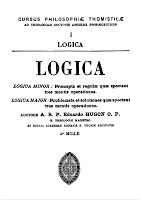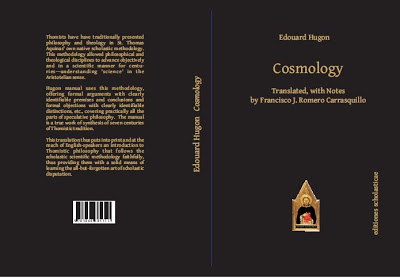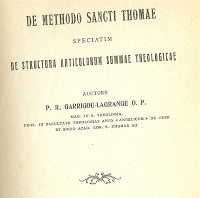Introduction
Rationale for the Project: The Ite ad Thomam Translation Project, in existence since 2009, and currently organized by STAGS, aims to make available in English translation some of the principal, representative works of Scholastic Thomism, including course manuals and commentaries on St. Thomas currently available in Latin through Ite ad Thomam's Out-of-Print Library (ITOPL).
Traditionally, Thomists have presented philosophy and theology in Latin and in its native scholastic methodology. This methodology allowed philosophical and theological disciplines to advance objectively and in a scientific manner (understanding 'science' as Aristotle did), and the Latin language gave it the precision and universality it required for being transmitted effectively throughout the world.
Since the turn of the 20th century, however, Thomists gradually began to abandon both the Latin language and the scholastic method that had characterized Thomism since its inception. The abandonment of the method has brought dire consequences for Thomism, for philosophy and theology, and for the intellectual life of the Church. Moreover, the abandonment of Latin has caused a linguistic gap between the novelty-ridden Thomism of today and the traditional Scholastic Thomism of past decades and centuries.
The overall result is that the contemporary English-speaking Thomist, professional and layman alike, is generally not habituated to thinking scholastically, because he has no easy access to Scholastic-Thomistic works in English. Priests and seminarians no longer know how to form a solid theological argument, and as a consequence, have a difficult time defending the faith. Self-professed Thomists do not know how to utilize the very method that St. Thomas used. The result is that Thomism is derided, and seen at best (often among Thomists themselves) as one option among many others. The restoration of Thomism requires a translation of Scholastic-Thomistic works into a current universal language, such as English.
The project thus expects to have a great impact on both university and seminary education by making available in English to seminarians and university students the scholastic manuals that have been in a sense hidden away from them in the last five decades.
Traditionally, Thomists have presented philosophy and theology in Latin and in its native scholastic methodology. This methodology allowed philosophical and theological disciplines to advance objectively and in a scientific manner (understanding 'science' as Aristotle did), and the Latin language gave it the precision and universality it required for being transmitted effectively throughout the world.
Since the turn of the 20th century, however, Thomists gradually began to abandon both the Latin language and the scholastic method that had characterized Thomism since its inception. The abandonment of the method has brought dire consequences for Thomism, for philosophy and theology, and for the intellectual life of the Church. Moreover, the abandonment of Latin has caused a linguistic gap between the novelty-ridden Thomism of today and the traditional Scholastic Thomism of past decades and centuries.
The overall result is that the contemporary English-speaking Thomist, professional and layman alike, is generally not habituated to thinking scholastically, because he has no easy access to Scholastic-Thomistic works in English. Priests and seminarians no longer know how to form a solid theological argument, and as a consequence, have a difficult time defending the faith. Self-professed Thomists do not know how to utilize the very method that St. Thomas used. The result is that Thomism is derided, and seen at best (often among Thomists themselves) as one option among many others. The restoration of Thomism requires a translation of Scholastic-Thomistic works into a current universal language, such as English.
The project thus expects to have a great impact on both university and seminary education by making available in English to seminarians and university students the scholastic manuals that have been in a sense hidden away from them in the last five decades.
Fundraising: The Ite ad Thomam Translation project depends on generous donors for its existence. Translating texts from Scholastic Latin into English is not quite a glamorous job. It is a slow, meticulous, and financially unrewarding task, and it is no wonder so few are interested in doing it. It not only takes hours just to translate a handful of pages, but it also presupposes years of training in subject-specific skills with very little job-market value. Moreover, translation comes with little to no academic recognition, so scholarly prestige is not earned in the process. And unfortunately for translators, publishers today tend to keep most of the little profit they get from sales. If a translator gets any royalties at all, it is usually a very small percentage of the editor's revenue, and it is often not monetary at all (but in the form of free copies of the book). For this reason, fundraising is an important part of making a translation possible. We ask you to consider the importance of this project and make a generous financial contribution towards this noble endeavor.
Works Proposed: Below are the works that are currently being translated.
Edouard Hugon's Introduction to Scholastic Thomism

Translator(s): Francisco J. Romero Carrasquillo, Ph.D.
Hugon offers formal arguments with clearly identifiable (major and minor) premises and conclusion; formal objections with clearly identifiable distinctions, etc. Even though with respect to depth and sophistication the work's individual parts may be surpassed by other individual Thomistic authors (e.g., Garrigou-Lagrange, Ramirez, etc.), Hugon's manual has the advantage of offering the reader a solid, comprehensive, and faithfully-Thomistic treatment of practically all the parts of speculative philosophy, using the Scholastic method.
The proposed translation will be approximately 2,100 pages long, and will be published in eight volumes. At $8 USD per page, the project will cost approximately $16,800. So far, thanks to one generous donor, nearly half of the project has already been funded: the translation of the Cosmology volume (Ia-IIae) is complete and has been accepted by Editiones Scholasticae for publication. Ontology I is close to being completed. Major Logic and Appendix (24 Thomistic Theses) are next in line. At the time of writing, we still need $8,800 to fund the project completely (see fundraising progress below).
Original Text:
Edouard Hugon, Les Vingt-quatre theses thomistes. Paris: Tequi, 1926. (French Original.)
Edouard Hugon, Cursus philosophiae thomisticae, 6 vols. Paris: Lethielleux, 1927. (Latin Original.)
Ia Pars: Logica
Ia-IIae: Cosmologia
IIa-IIae: Biologia et Psychologia
IIIa, t. 1: Metaphysica Psychologica
IIIa, t. 2: Metaphysica Ontologica I
IIIa, t. 3: Metaphysica Ontologica II
Edouard Hugon, An Introduction to Scholastic Thomism, 8 vols. (Proposed Publisher: Editiones Scholasticae.)
Ia, vol. 1: Minor Logic, 213 pp (ca. $1,700).
Ia, vol. 2: Major Logic, 257 pp (ca. $2,100) - Fully funded, in progress.Ia-IIae: Cosmology, 326 pp (ca. $2,600) - Fully funded, in press.
IIa-IIae: Biology and Psychology, 342 pp (ca. $2,700).
IIIa, vol. 1: Metaphysical Psychology, 244 pp (ca. $2,000).
IIIa, vol. 2: Ontology I, 213 pp. (ca. $1,700) - Fully funded, final revisions in progress.
IIIa, vol. 3: Ontology II, 398 pp. (ca. $3,200).
Appendix: The Twenty-Four Thomistic Theses, 100 pp (ca. $800) - Fully funded, in progress.
Garrigou Lagrange on the Nature and Method of Theology
Some of the texts are here available in English translation for the first time in history, and those which have been previously translated are here translated afresh, in a more faithful style. The translator aims to render the texts literally into English, in all their scholastic rigor, without smoothing out scholastic idioms or technical expressions (which is what the translators of Garrigou's works in the 1940s-60s did, unfortunately).
The volume will be approximately 250 pp long (including the translator's introduction). At $8 USD per page, we are aiming at raising $2,000 for the translation. The proposed publisher is Sapientia Press.
The contents will include passages from the following works by Garrigou:
De revelatione per Ecclesiam catholicam proposita.
La Synthèse thomiste.
De Deo Uno: Commentarium in primam partem S. Thomae.
"De methodo Sancti Thomae."
"La Nouvelle théologie, ou va-t-elle?"
















1 comment:
I just recommended "De methodo Sancti Thomæ" to someone yesterday who was arguing that Aristotelian methodology shackles St. Thomas's theology and that theology must freed from such "fetters" by adopting methodologies more consonant with modernity (and thus with its copious false philosophies…), so it's good to see someone working on translating "De methodo".
Post a Comment